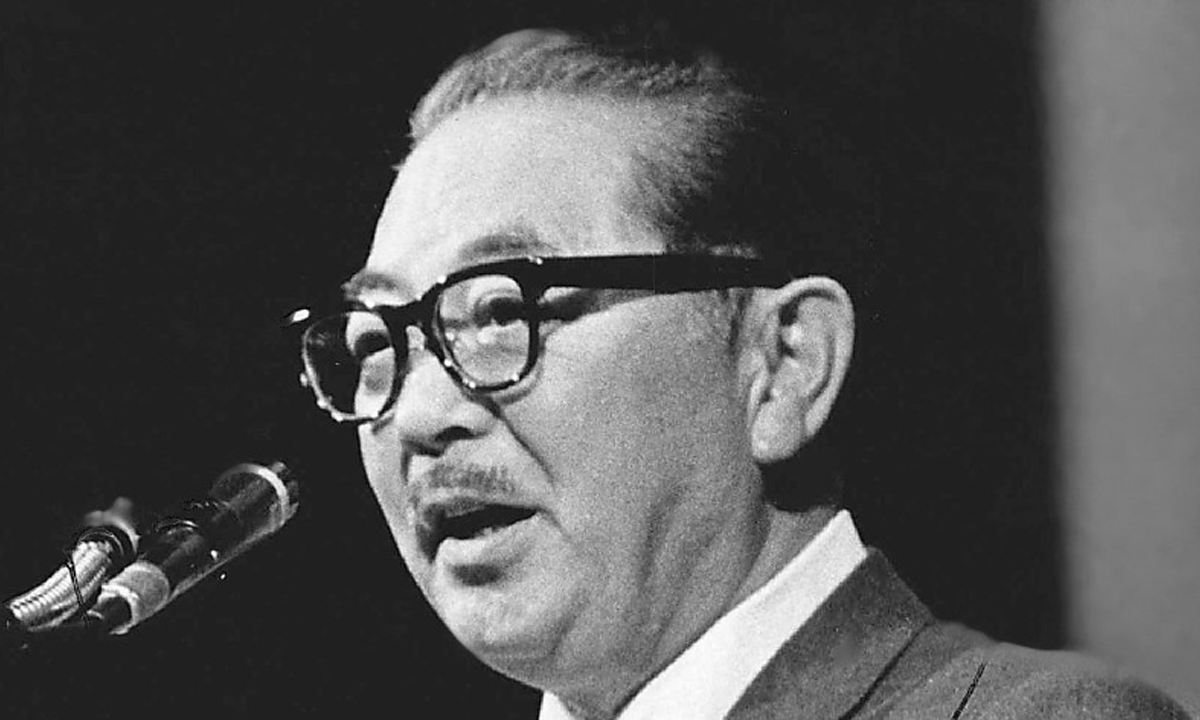Samuel Ichiye Hayakawa, known as S.I. Hayakawa was a Republican Senator from California from 1977 until 1983. He was born in Vancouver, Canada to Japanese immigrant parents. The family migrated to Winnipeg when S.I. was a young boy. His father traveled frequently to Japan with his import business. His long absences led his mother to return to Japan with his two younger sisters leaving S.I. and his brother in Canada.
Hayakawa went off to study in Montreal moving in with an uncle. He graduated from the University of Manitoba with a B.A. in English. He received his Master’s degree in English from McGill University working nights as a taxi driver. He moved on to complete his Ph.D. in English in 1935 from the University of Wisconsin-Madison writing his thesis on the poet Oliver Wendell Holmes. While at the University of Wisconsin, he met and married Margedant Peters. The subsequent year he was hired by the Japanese Canadian Citizens League to lobby Parliament for voting rights on behalf of West Coast Canadian Nisei who was barred from voting due to their Japanese ancestry. This effort was unsuccessful.
He went off to Chicago where he became a Professor of English at the Illinois Institute of Technology. He became focused on General Semantics Theory as set forth by Alfred Korzybski. He published his most noted book on Semantics “Language in Action” in 1949 which became a bestseller and the Book of the Month Club selection. In his book, he warned of the dangers of propaganda, slogans, and fear-mongering on the formation of public opinion.
He moved on to the University of Chicago as a lecturer. During his tenure there he published “The Semantic Barrier” which discussed the theory of personality from the semantic point of view. While living in Chicago, he was contacted by a former roommate from the University of Wisconsin, Robert Frase who now worked for the War Relocation Authority. He asked Hayakawa to advise him on the resettlement prospects for people of Japanese descent in the Chicago area as a result of the infamous Executive Order 9066. There is no surviving comment by S.I. in regards to Executive Order 9066. During the war, he joined the African American newspaper The Chicago Defender where he contributed a weekly column. He clearly deplored racial discrimination on blacks but rarely commented on the prejudice against Japanese Americans. He was sympathetic to the cause of people of Japanese descent describing their internment bluntly as being put in concentration camps, but he did not want to be seen as a Nisei or have his own rights limited as a result of the bias against the Japanese. At the end of the war, he joined and helped finance the Chicago Resettlers Committee as well as the Japanese American Citizens League Anti-Discrimination Committee. He also sent help to his parents in Japan.
In 1955 he was named Professor at San Francisco State University, the same year he became a US Citizen. He became well known as a lecturer, writer, and editor of the semantics journal ETC. He parted ways with the Japanese American community as they supported the McCarran-Walter bill which allowed for naturalization for Japanese immigrants and immigration quotas from Asian countries. He personally would have benefited from the passage of this bill but he felt there were repressive aspects to the bill that would have negative impacts on other groups. He also decried the continued existence of separate Nisei organizations as he felt they were no longer necessary to combat discrimination.
In 1968, Hayakawa was named Acting President of San Francisco State University. Ronald Reagan was Governor and Joseph Alioto was Mayor of San Francisco. The following year, students, along with the Black Panthers, the Third World Liberation Front and supported by the Students for a Democratic Society engaged in a very acrimonious strike demanding an ethnic studies program at the university along with the end to the Vietnam war. S.I. Hayakawa became the darling of conservatives when he famously climbed up on the sound truck at a rally and pulled out the wires from the loudspeakers. Ultimately he relented establishing the first-in-the-nation College of Ethnic Studies in 1968. The following year, the Board of Trustees appointed Hayakawa President of San Francisco State University.
In 1973, he retired from academia, became a journalist and a Republican. Three years later he successfully ran as the political “outsider” against the Democratic incumbent for the US Senate. He served one term in the US Senate. During his term, he supported the Torrijos-Carter treaties which transferred control of the Panama Canal back to Panama. He also supported the bill that created the historical Commission on Wartime Relocation and Internment of Civilians which studied the causes and effects of the incarceration of Japanese American citizens during WWII although he was against any reparations or apologies. He also strongly lobbied for the successful campaign to pardon Iva Toguri D’Aquino (Tokyo Rose) as she had steadfastly refused to renounce her American citizenship during the war even under duress. During his tenure, S.I. Hayakawa was one of three Japanese Americans in the US Senate. Due to trailing polls and lack of money, Hayakawa decided not to run again for the Senate. He was succeeded by Pete Wilson.
Photo via Getty Images




